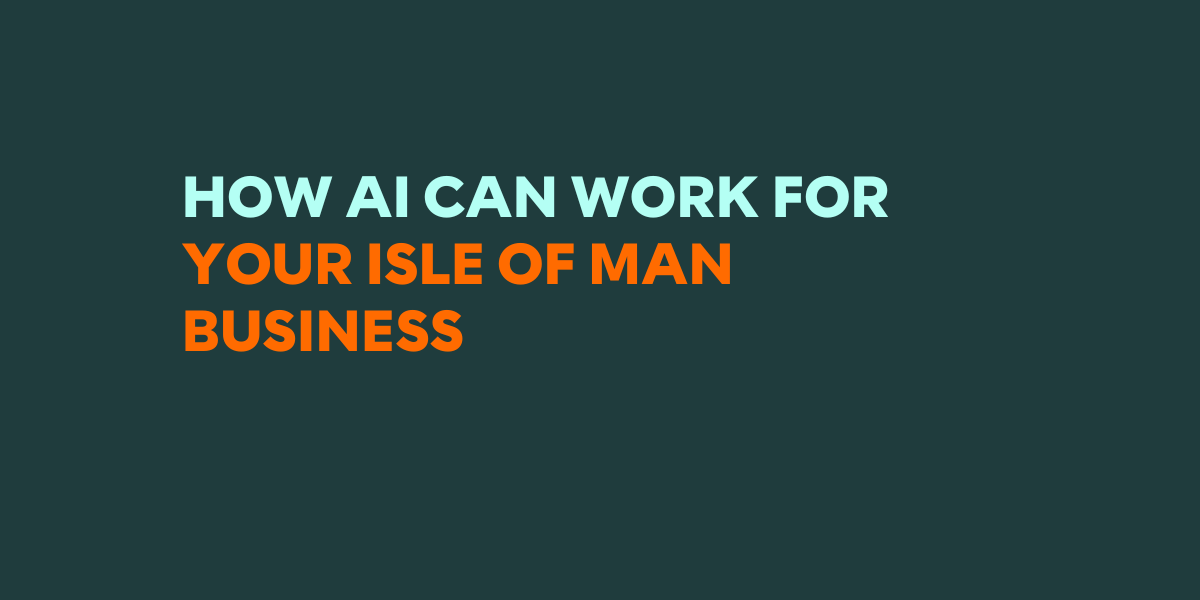Digital Matters: Vital role of the business angel investor
02 October 2018

Digital Isle of Man Board Member, Katie Nicholson, discusses the vital role of the business angel investor.
The Isle of Man has been seeing a significant increase in the number of entrepreneurs looking to set up their businesses on the Island, naturally resulting in the demand for Business Angels. Earlier this year the Department for Enterprise announced that it had processed its 1000th enquiry since September 2015, with 88 new businesses set up through the Department’s Micro Business Grant Scheme over the past year, recognising the entrepreneurial demand that is growing on the Isle of Man.
Business Angels in the UK collectively inject £1.5 billion a year into British start-up companies. They are known for playing a significant role in the economy, stimulating and encouraging entrepreneurial activity through patient capital, business experience and skills to support the growth of small businesses.
The right funding at the right time, coupled with the expertise that external angel investors can bring, is often the key to unlocking rapid growth for companies wanting to expand, diversify, or enter new markets.
Angel investors: What is an angel investor?
Angel investors are often described as high-net worth individuals who invest their own money (often from the sale of their own business). They tend to invest alone or as part of a syndicate, in businesses where there is no family connection. However, this doesn’t have to be the case, anybody who has good experience and can add value to a business can invest. You don’t have to be a multimillionaire.
These investments can either be in businesses in the early stages of development or in established companies looking for capital to expand and grow. Angels normally invest in the form of equity finance with the hope of achieving a significant financial return through some form of an exit.
Angels can provide multiple rounds of finance and frequently co-invest with other sources of finance. Business angels provide two key assets: One is ‘smart capital’ or ‘sweat equity’ where they offer their business experience and networks to pivot early-stage businesses to a higher growth trajectory. They will often take a non-executive board position in the company to add significant value through their own experience. The second is ‘patient capital’ because to develop the business in this way takes time. Therefore, by acting as long-term investors, angels can play a significant role in getting innovative businesses ideas off the ground. For a growing business, this combination of expertise and capital can be crucial for success. The angel investment market tends to be less sensitive to economic cycles, and they tend to invest locally with many angels in the UK only considering investments within a couple of hours of their home.
Why do they invest?
Many entrepreneurs with an unproven business plan struggle to finance their ideas. Angel investors assist these entrepreneurs and help them to flourish with initial and follow-on capital to further finance their business. Many angels talk about ‘the thrill of being involved with a young company’. However, it is important to consider that an angel’s investment decisions are based on their assessment of the individuals running the business, as well as the business plan. Almost all investors think it is essential that entrepreneurs have the right vision, belief and focus emphasising the importance of the potential of the business to achieve growth and scale.
For most angels, it is essential that the entrepreneurial team demonstrate the relevant skills and experience. Emphasis is also placed on the character, connection and relationship with the founders as vital (people invest in people!). Unsurprisingly, the potential for growth is also seen as core to the investment decision along with expected returns and a realistic valuation.
Angels want to invest in products and business models that show strong potential to disrupt the sector. In a recent survey conducted by the British Business Bank and the UK Business Angels Association, Healthcare, BioTech, Fintech, Software as a Service (SaaS) and E-commerce came out as the top investment sectors, all of which are digital and technology led.
As a founder or CEO of a start-up, it is important to recruit the right team around you, get good at hiring, firing (if it isn’t working be prepared to act quickly to change that), and delegating. Be tenacious, never give up, focus on the big prize and be willing to pivot and/or adapt your business model to circumstantial factors in the business environment.
How do business angels contribute to growth in the economy?
Investments by business angels are largely focused on new and early stage technology ventures. Business angels are particularly important from an economic development perspective because the majority of their investments are local, hence they are typically recycling and reinvesting locally created wealth. The geographical concentration of venture capital investing in core regions throughout the UK, means that business angels are particularly important in places such as the Isle of Man. The importance of business angels in supporting the development of a dynamic entrepreneurial economy has been recognised with the formation of angel networks on-island.
Angels want to support talented entrepreneurs and back businesses that can make a difference in their sectors. A successful angel requires an exit with a positive return, the most common being an exit by trade sale. However, many like to combine this success with working with companies that have a positive impact on society or their region.
And the digital economy…
The digital economy is shaking the foundations of legacy industries with financial services already in the midst of disruption. It would be difficult not to pay attention to the rise of the ‘challenger banks’ all of whom are disrupting the traditional banking models through their use of technology.
2013 saw the formation of Revolut, in 2014 Starling Bank was founded and in 2017 millennial favourite Monzo was launched. Whilst Monzo (a London based digital only bank) closed a funding round of £71 million in November 2017, they first started with a seed round of £1million from 1800 investors on CrowdCube in April 2016, raised in just 96 seconds! Whilst many of those following in their footsteps will be starting with more modest asks (from acorns mighty oaks grow) there is no denying that the digital economy needs to be funded. Artificial intelligence and blockchain will continue to disrupt, creating real opportunities for the growing number of angel investors.
The Isle of Man
Ideas that become start-ups that then turn into true economic engines touch a lot of people along the way. Those ideas are fostered and shaped by founders, then investors, and later then by management teams, clients and customers. That is why having the right environment early on is so important to a start-up's success. Founders need mentors and people in the community who have been there and done that and can help shepherd the next generation of entrepreneurs along.
Early stage business investment has a significant role to play in the ambition to grow the economy of the Isle of Man. It has long been recognised that entrepreneurs play a crucial role in economic development: by acting on new opportunities and developing innovative, new products and services.
The concept of an entrepreneurial ecosystem refers to the social and economic environment which affects local or regional entrepreneurship. The emergence of new start-ups is not only because of innovative, talented and visionary individuals but also because of the environment or ‘ecosystem’ made up of private and public sector stakeholders that nurture and sustain them in a bid to make the actions of entrepreneurs easier. The last couple of years has seen the island’s own ecosystem start to thrive with the creation of an angel network and shared co-working space around the Island sitting alongside our experienced advisory services, particularly the legal and accountancy sectors.
There are a number of options for entrepreneurs seeking funding on the Isle of Man. The Isle of Man Department for Enterprise recently announced an increase to their micro business start-up grant from £5,000 to £6,000. Over the course of the last two years this scheme has helped the creation of 150 small businesses and helped to train 350 people with the skills required to start their own business.
Aside from the standard grant of £6,000, businesses that substantially export can receive up to £15,000. Through the Enterprise Development Scheme (EDS) additional funding may also be available to businesses that help create new jobs on the Island.
The EDS provides grant, loan and equity investment to new start-ups, existing expanding businesses and businesses wishing to relocate to the Island. The aim of the scheme is to encourage the growth and diversification of the economy through the development of existing businesses and the pursuit of new opportunities.
As a board member of the newly formed Digital Isle of Man Agency I am looking forward to working with industry leaders on the many opportunities facing the digital economy of the Isle of Man. We have a strong foundation and a real opportunity to create long term, sustainable growth for our Island’s economy.
al Isle of Man Agency I am looking forward to working with industry leaders on the many opportunities facing the digital economy of the Isle of Man.
We have a strong foundation and a real opportunity to create long term, sustainable growth for our island’s economy.
To view the original Isle of Man Today article, click here.





